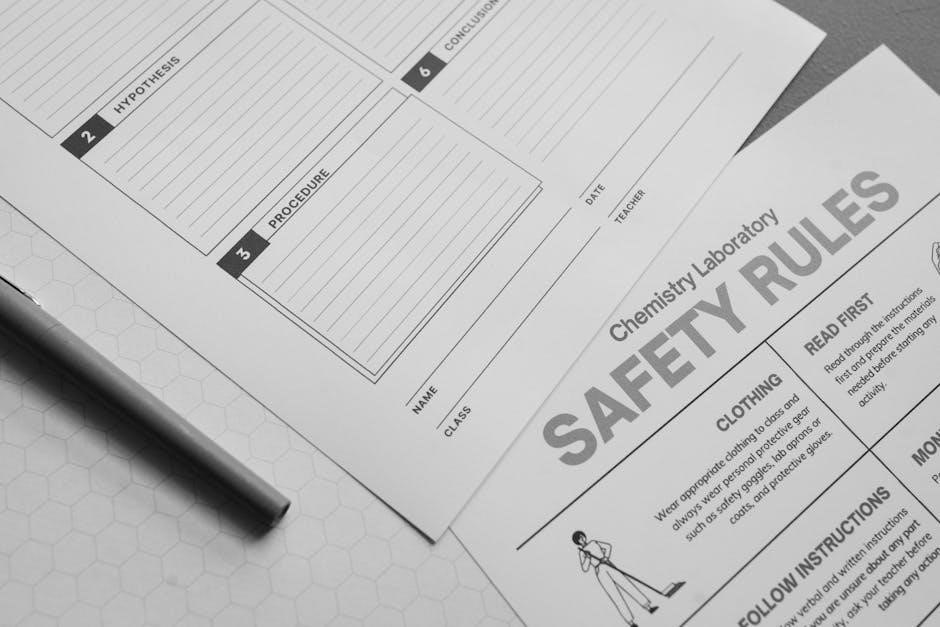nursing student study guides
Effective Study Strategies for Nursing Students

Nursing students should focus on active learning, critical thinking, and clinical reasoning to master complex concepts. Engaging with evidence-based resources and practicing time management enhances academic success and clinical preparedness.
1.1 Time Management and Organization Tips
Effective time management is crucial for nursing students to balance academic demands and clinical training. Create a detailed study schedule, setting clear goals for each session. Use planners or digital tools to organize tasks and deadlines. Prioritize complex topics and allocate sufficient time for review; Break study materials into manageable sections to avoid overwhelm. Dedicate specific periods for practice questions and simulations to enhance retention. Avoid procrastination by tackling challenging subjects first. Regularly review notes and lecture materials to reinforce learning. Establish a dedicated study environment free from distractions. By maintaining a structured routine, nursing students can efficiently manage their workload and achieve academic success.
1.2 Active Learning Techniques for Nursing Concepts
Active learning is essential for nursing students to grasp complex concepts effectively. Techniques such as group discussions, case studies, and hands-on simulations encourage engagement and practical application of knowledge. Nursing students benefit from interactive activities like problem-solving exercises and role-playing, which enhance critical thinking and clinical judgment. Utilizing flashcards and concept maps can help visualize relationships between key terms and ideas. Additionally, participating in study groups fosters collaboration and shared understanding. Incorporating real-life scenarios and patient care examples makes learning more relatable and prepares students for clinical settings. Regular self-assessment through quizzes and practice questions further reinforces retention. By actively engaging with course material, nursing students develop a deeper understanding of nursing principles and improve their ability to apply them in real-world situations.

Developing Critical Thinking and Clinical Reasoning
Critical thinking and clinical reasoning are vital for nursing students. Study guides provide exercises and real-life scenarios to enhance these skills, connecting theory with patient care.

2.1 The Importance of Critical Thinking in Nursing Practice
Critical thinking is a cornerstone of nursing practice, enabling nurses to make sound decisions and provide safe, effective care. It involves analyzing patient data, identifying patterns, and applying evidence-based knowledge to resolve complex problems. Nurses must assess symptoms, lab results, and treatment responses to deliver personalized care. Critical thinking also fosters a deeper understanding of patient needs, promoting empathy and holistic care. In high-stakes environments, sharp analytical skills prevent errors and improve patient outcomes. Study guides emphasize scenarios that simulate real-world challenges, helping students refine their critical thinking abilities. By mastering this skill, nursing students become competent professionals capable of navigating the demands of modern healthcare.
2.2 Strategies to Enhance Clinical Reasoning Skills
Developing strong clinical reasoning skills is essential for nursing students to deliver effective patient care. One key strategy is practicing case-based learning, where students analyze real patient scenarios to identify patterns and prioritize interventions. Simulation labs provide hands-on experiences, allowing students to apply theoretical knowledge in controlled environments. Additionally, using evidence-based practice resources and guidelines helps students connect classroom concepts with clinical decisions. Active reflection and debriefing after simulations or case studies enhance learning and improve critical analysis. Encouraging students to question and challenge their own reasoning fosters deeper understanding. Finally, incorporating peer discussions and mentorship programs offers diverse perspectives and expert guidance, refining clinical judgment and preparing students for real-world challenges.

Evidence-Based Practice in Nursing Education
Evidence-based practice integrates best research evidence, clinical expertise, and patient preferences. Nursing students should use databases like CINAHL and systematic reviews to guide informed decision-making effectively.
3.1 Understanding Evidence-Based Practice
Evidence-based practice (EBP) is a cornerstone of modern nursing, combining research, clinical expertise, and patient preferences. It ensures care is effective, safe, and tailored to individual needs. Nursing students should learn to critically appraise studies, identify reliable sources, and apply findings to real-world scenarios. This approach fosters a culture of lifelong learning and accountability. By mastering EBP, students develop the skills to deliver high-quality care and stay updated with the latest advancements in healthcare.

3.2 Resources and Tools for Evidence-Based Learning

Nursing students can utilize various resources to engage in evidence-based learning. Databases like CINAHL and PubMed provide access to peer-reviewed articles and research studies. Tools such as clinical guidelines from organizations like NICE and ACS offer evidence-based recommendations. Additionally, systematic reviews and meta-analyses are invaluable for synthesizing large amounts of research. Online platforms like Trip Database and Cochrane Library also aid in locating high-quality evidence. These resources enable students to critically evaluate research, apply findings to clinical scenarios, and make informed decisions. Regularly updating knowledge with these tools ensures nursing students stay aligned with current best practices in patient care.

Managing Stress and Burnout as a Nursing Student
Nursing students often face high stress levels due to academic demands and clinical pressures. Implementing coping strategies like mindfulness, time management, and seeking support can help mitigate burnout effectively.
4.1 Identifying Sources of Stress in Nursing Programs
Nursing students often encounter stress from academic rigor, clinical rotations, and high expectations. Heavy workloads, time constraints, and fear of failure amplify anxiety. Additionally, balancing studies with personal life can overwhelm many. Clinical environments may add pressure due to patient care responsibilities and demanding instructors; Financial burdens and limited support systems further contribute to stress. Recognizing these sources is the first step toward developing coping strategies and improving well-being. Understanding these challenges helps students and educators address them proactively, fostering a healthier learning environment. Acknowledging the multifaceted nature of stress in nursing programs is essential for student success and retention. Effective stress management begins with identifying its root causes.
4.2 Coping Strategies for Nursing Students
Nursing students can manage stress by implementing effective coping strategies. Prioritizing tasks, setting realistic goals, and practicing time management are essential. Engaging in mindfulness, meditation, or yoga can reduce anxiety and improve focus. Regular physical activity, a balanced diet, and adequate sleep also contribute to overall well-being. Building a support network of peers, mentors, and family helps share burdens and gain perspective. Setting aside time for hobbies and relaxation can recharge energy levels. Seeking professional counseling when needed is a proactive step toward mental health. Developing resilience and a growth mindset enables students to navigate challenges more effectively. By adopting these strategies, nursing students can better handle stress and thrive in their programs.

Preparing for the NCLEX-RN Exam
Focusing on key content areas like pharmacology, medical-surgical nursing, and pediatric care is crucial. Utilizing practice questions, review guides, and simulation tools enhances test-taking confidence and success.
5.1 Key Topics and Content Areas to Focus On
Pharmacology, medical-surgical nursing, and pediatric care are critical areas for NCLEX-RN success. Students should emphasize understanding drug interactions, prioritizing patient care, and managing chronic conditions. Maternal-newborn health, mental health, and community health are also essential. Mastery of lab interpretations, ethical dilemmas, and delegation of care is crucial. Nursing process questions, including assessment, diagnosis, and evaluation, are frequently tested. Students should focus on identifying patient needs, safety, and effective care planning. Practicing with case studies and high-fidelity simulations can enhance clinical judgment. Reviewing NCLEX-RN test plans and focusing on high-weight content ensures a well-rounded preparation strategy. Utilizing practice questions and review guides helps reinforce these key areas effectively.
5.2 Effective Test-Taking Strategies for Success

Mastering test-taking strategies is crucial for NCLEX-RN success. Start by carefully reading each question and identifying keywords in the stem. Eliminate obviously incorrect answers first to narrow down choices. Practice active recall and use mnemonics to retain complex information. Time management is key—allocate 60-90 seconds per question to avoid running out of time. Focus on prioritizing patient safety and outcomes in your answers. Use the process of elimination and look for clues in the question that hint at the correct answer. Regularly practice with sample NCLEX questions and review rationales to understand the reasoning behind each answer. Stay calm and use relaxation techniques to maintain focus during the exam. Consistent practice and reviewing test plans can significantly improve performance.


